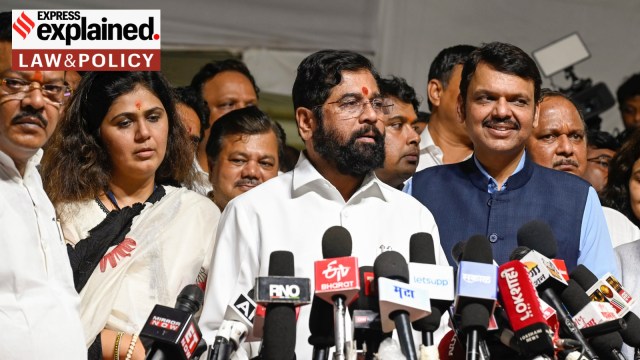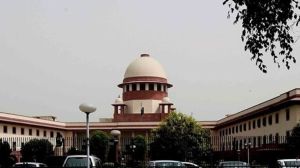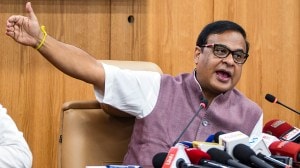What is Maharashtra’s new Bill to curb ‘Naxalism in urban areas’?
Maharashtra government officials have cited the requirement of sanction from a competent authority of the central or state government as a hindrance for prosecuting under UAPA.
 Maharashtra Chief Minister Eknath Shinde along with Deputy CM Devendra Fadnavis in Mumbai on July 12. (Photo: PTI)
Maharashtra Chief Minister Eknath Shinde along with Deputy CM Devendra Fadnavis in Mumbai on July 12. (Photo: PTI)The Maharashtra government has proposed a sweeping new law to deal with the “increasing presence of Naxalism in urban centres”. The Bill, introduced in the Assembly on Thursday (July 11), targets a wide range of actions by suspects: interference with the maintenance of public order and administration of the law, generating fear and apprehension in the public, encouraging or preaching disobedience of the law, etc.
The provisions of the Bill have been criticised for being “draconian”, and concerns have been raised over its wide definitions.
“This is nothing but to muzzle protests,” former Chief Minister and Congress MLA Prithviraj Chavan said. The People’s Union for Civil Liberties has said that the Bill is “unconstitutional and [has been] brought with a view to curb dissent”.
What are the government’s reasons for bringing the Bill?
The statement of objects and reasons of The Maharashtra Special Public Security (MSPC) Bill, 2024, introduced by Deputy Chief Minister Devendra Fadnavis, says the “menace of Naxalism is not only limited to remote areas of the Naxal affected states, but its presence is increasing in the urban areas also through the Naxal front organisations”.
According to the government, these “frontal organisations” provide logistics and safe refuge to armed Naxal cadres, and “existing laws are ineffective and inadequate to tackle this menace of Naxalism”. To address this situation, the states of Chhattisgarh, Telangana, Andhra Pradesh, and Odisha have enacted Public Security Acts and banned 48 Naxal frontal organisations, says the Bill.
When could the Bill become law?
The Bill has been brought at the fag end of the term of the Assembly, and its progress will most likely depend on the next government of Maharashtra. The day after the Bill was tabled, the monsoon session of the Assembly was prorogued. The House is not scheduled to meet again before the elections in the state, which will be held by November.
The Bill will lapse with the dissolution of the Assembly, and will have to be reintroduced in the new House — unless the current government brings an ordinance to implement it in its term.
What are the main provisions of the proposed law?
The Bill gives the government the power to declare any suspect “organisation” as an “unlawful organisation”. It prescribes four offences for which an individual can be punished: (i) for being a member of an unlawful organisation, (ii) when not a member, for raising funds for an unlawful organisation, (iii) for managing or assisting in managing an unlawful organisation and, (iv) for committing an “unlawful activity”.
These four offences carry jail terms of up to two years to seven years, along with fines ranging from up to Rs 2 lakh to Rs 5 lakh. The offence relating to committing an unlawful activity carries the toughest punishment: imprisonment of seven years and a fine of Rs 5 lakh.
Offences under the proposed law are cognizable, which means arrests can be made without a warrant, and non-bailable.
How is the Maharashtra Bill different from the Unlawful Activities Prevention Act, 1967 (UAPA)?
The UAPA is India’s main anti-terror law that is used most commonly in Naxalism-related cases. The UAPA, too, gives the state the power to designate associations as “unlawful associations”.
Both the UAPA and the MSPC Bill prescribe similar procedures for making such a declaration. Under the UAPA, a Tribunal headed by a judge of a High Court confirms the declaration made by the state. In the MSPC Bill, an advisory board consisting of “three persons who have been or are qualified to be” a judge of an HC are tasked with carrying out the confirmation process.
And what exactly constitutes “unlawful activity” in the Bill tabled in the Maharashtra Assembly?
This is the heart of the proposed law in Maharashtra. Like the UAPA, the MSPC Bill also seeks to criminalise “unlawful activity”, but its definition is vastly different.
The UAPA’s definition of “unlawful activity” includes “cession” or “secession” of a part of the territory of India from the Union; any act that “disclaims, questions, disrupts or is intended to disrupt the sovereignty and territorial integrity of India”; and causing “disaffection against India”.
Though broad, these words have been defined by courts over the years, and their interpretation follows certain judicial benchmarks. The Maharashtra Bill, however, prescribes a far lower threshold for acts to be included in the definition of “unlawful activity”.
Maharashtra government officials have cited the requirement of sanction from a competent authority of the central or state government as a hindrance for prosecuting under UAPA. Under the proposed law, the necessary permission to prosecute can be given by the district magistrate or police commissioner, which will quicken the process, an official said.
According to this official, the faster process proposed in the Maharashtra Bill will also ensure that accused are not acquitted because of delays in obtaining sanctions.
The following acts, either written or spoken, constitute unlawful activity under the Maharashtra Bill:
“(i) which constitute a danger or menace to public order, peace is and tranquility; or
(ii) which interferes or tends to interfere with maintenance of public order; or
(iii) which interferes or tends to interfere with the administration of law or its established institutions and personnel; or
(iv) which is designed to overawe by criminal force or show of criminal force or otherwise to any public servant including the forces of the State Government or the Central Government in exercise of the lawful powers of such public servant and Forces ; or
(v) indulging in or propagating, acts of violence, vandalising or other acts generating fear and apprehension in the public, or indulging in or encouraging, the use of firearms, explosives or other devices or disrupting communications by rail, road, air or water; or
(vi) encouraging or preaching disobedience to established law and its institutions; or
(vii) collecting money or goods to carry out any one or more of the unlawful activities mentioned above…”





- 01
- 02
- 03
- 04
- 05

































